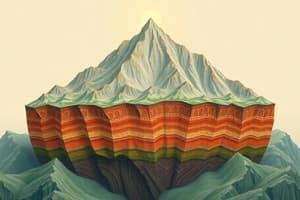Podcast
Questions and Answers
What is the primary process responsible for the formation of the Himalayan mountain range?
What is the primary process responsible for the formation of the Himalayan mountain range?
- Oceanic-continental convergence
- Block mountain formation
- Continental collision (correct)
- Sea-floor spreading
Which of the following geological processes is NOT directly involved in mountain formation?
Which of the following geological processes is NOT directly involved in mountain formation?
- Weathering
- Denudation
- Plateau formation (correct)
- Erosion
Which of the following factors does NOT influence mountain formation?
Which of the following factors does NOT influence mountain formation?
- Gravity (correct)
- Tectonic forces
- Geological time
- Climate
What is the result of oceanic-continental convergence in terms of mountain formation?
What is the result of oceanic-continental convergence in terms of mountain formation?
What is the primary mechanism responsible for the formation of the Rocky Mountains?
What is the primary mechanism responsible for the formation of the Rocky Mountains?
What is the process of creating mountains through geological processes?
What is the process of creating mountains through geological processes?
What is a steep rock face formed by erosion and weathering?
What is a steep rock face formed by erosion and weathering?
What is the accumulation of sediment along the coastline?
What is the accumulation of sediment along the coastline?
What is the bending of rock layers to form mountains?
What is the bending of rock layers to form mountains?
What is the highest point of a mountain?
What is the highest point of a mountain?
Flashcards are hidden until you start studying
Study Notes
Mountain Formation
Plate Tectonics and Mountain Building
- Continental collision: process where two continental plates collide, resulting in mountain formation (e.g., Himalayas)
- Oceanic-continental convergence: process where an oceanic plate converges with a continental plate, resulting in mountain formation (e.g., Andes)
- Sea-floor spreading: process where new oceanic crust is created, resulting in mountain formation (e.g., Mid-Atlantic Ridge)
Types of Mountain Formation
- Fold mountains: formed when two plates compress and fold, resulting in mountain formation (e.g., Rocky Mountains)
- Volcanic mountains: formed when magma rises to the surface, resulting in volcanic mountain formation (e.g., Mount Fuji)
- Block mountains: formed when a plate is broken into blocks, resulting in mountain formation (e.g., Sierra Nevada)
Geological Processes Involved in Mountain Formation
- Uplift: process where the Earth's surface is raised, resulting in mountain formation
- Denudation: process where the Earth's surface is worn away, resulting in mountain formation
- Weathering: process where rocks are broken down, resulting in mountain formation
- Erosion: process where rocks are carried away, resulting in mountain formation
Factors Influencing Mountain Formation
- Tectonic forces: forces that shape the Earth's surface, resulting in mountain formation
- Geological time: time span over which mountain formation occurs
- Climate: weather patterns that influence mountain formation (e.g., glaciers, erosion)
Examples of Mountain Ranges
- Himalayan mountain range: formed by the collision of the Indian and Eurasian plates
- Andes mountain range: formed by the subduction of the Nazca plate under the South American plate
- Rocky Mountains: formed by the collision of the North American and Pacific plates
Studying That Suits You
Use AI to generate personalized quizzes and flashcards to suit your learning preferences.




